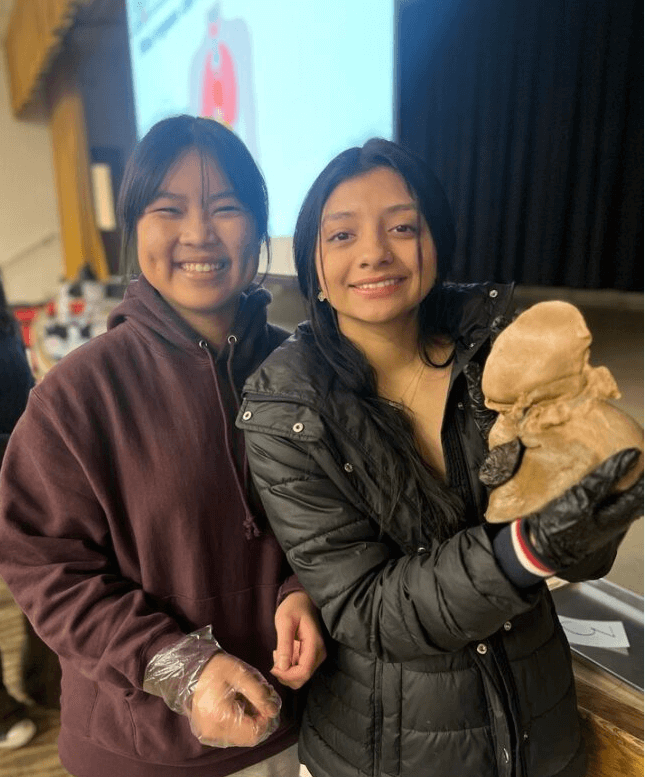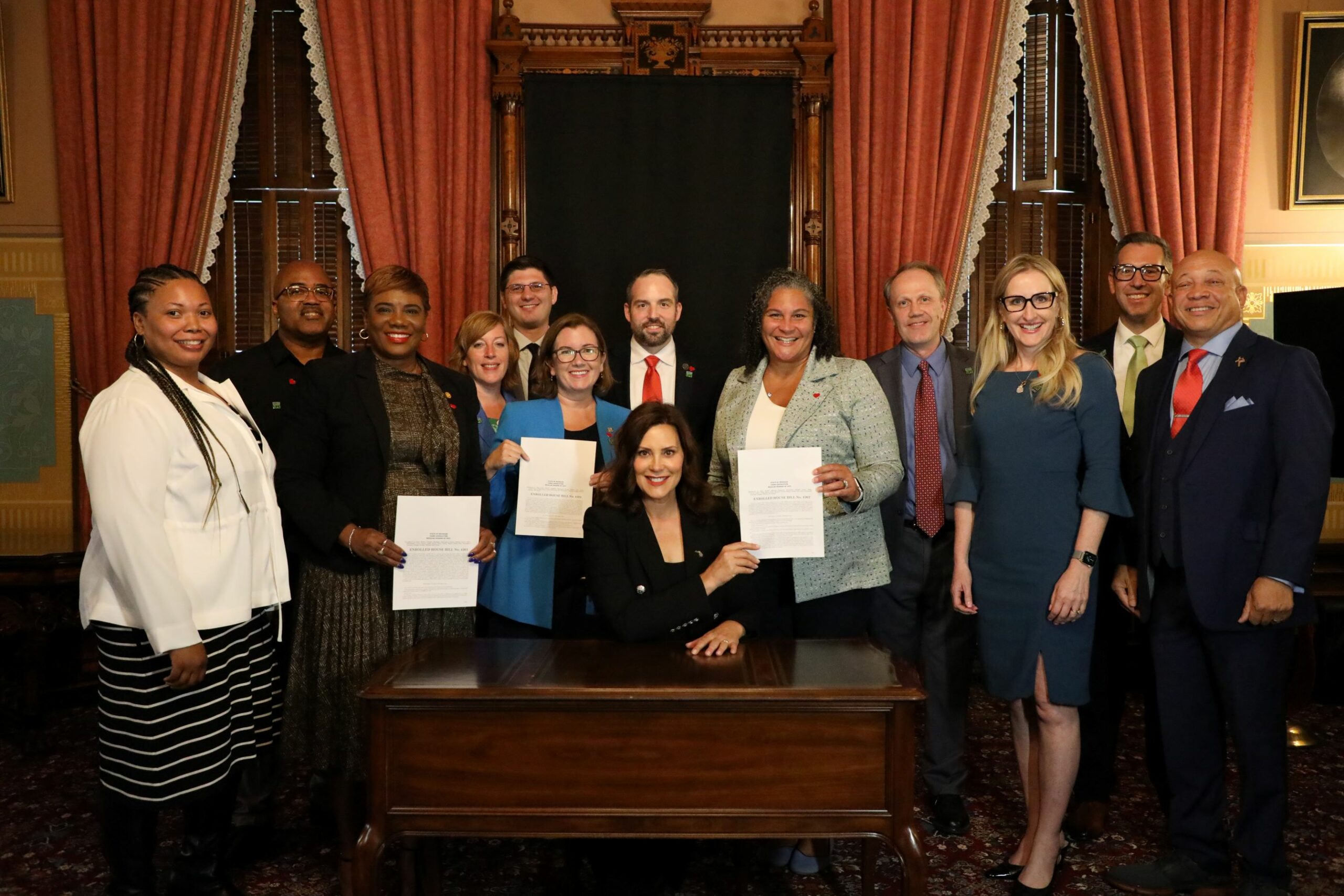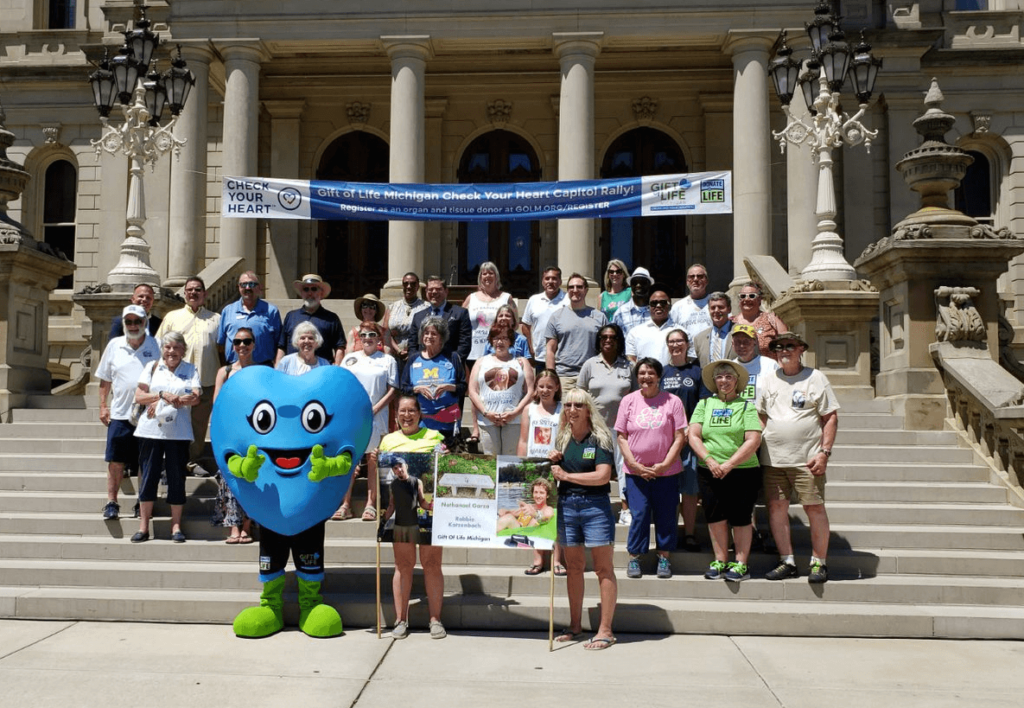3 طرق للبقاء على اطلاع
- يتبع Gift of Life Michigan على Facebook
- يتبع Gift of Life Michigan على LinkedIn
- انضم الينا القائمة البريدية
شجع المسؤولين المنتخبين على دعم التشريعات الصديقة للتبرعات
Michigan Senate introduces new bills focused on organ, eye and tissue donation education
April 16, 2025
Sen. Daley (R-Lum) introduced the Patient Access to Donor Registry Information Bill. The bill would help save lives in Michigan by encouraging family doctors and urgent care centers to provide patients with information about organ, eye, tissue, and bone marrow donation. Studies show that family doctors are the most trusted source of information for those who are hesitant to register as organ donors.
The legislation would encourage but not require family doctors to provide information about donation and encourage people to add their names to the Michigan Organ Donor Registry. The bill comes just as Donate Life America announced a national collaboration that offers patients a seamless way to register as organ, eye and tissue donors directly through patient online portals in MyChart.
In addition to Sen. Daley’s sponsored bill, Sen. Joseph Bellino (R-Monroe) introduced the High School Organ Donation Education Bill. The new bill recommends education about organ, eye and tissue donation and the Donor Registry to all ninth graders in Michigan public schools.
Only 38% of teen drivers in Michigan register as organ donors, about half the percentage that other states get. This bill aims to change that. Ohio, Indiana, and Illinois require education about donation in public schools. This legislation takes a step in that direction.
Expanding education about organ donation and the Donor Registry also addresses the racial health disparities in communities of color. African Americans disproportionately suffer from kidney failure and high blood pressure, which are leading causes of organ failure. For many communities concentrated in Detroit, where the cost of auto insurance is the highest in the nation, only a small percentage of teenagers take driver’s education.
More than 4.6 million Michigan residents are on the Donor Registry. About 2,600 Michigan residents are waiting for a life-saving organ. The best way to save lives is by joining the Donor Registry.

Gov. Whitmer signs bill to add Organ Donor Registry question to state income tax forms in 2024
CHECK YOUR HEART ACT IS THE FIRST OF ITS KIND IN THE NATION.
Groundbreaking legislation to bolster the سجل ميشيغان للمانحين became law summer 2023 with Gov. Gretchen Whitmer’s signature on the Check Your Heart Act, clearing the way for residents to sign up on their state income tax forms next year.
The Department of Treasury will process donor registrations with the Michigan Department of State. Those who register will then be able to have the red donor heart icon on their driver’s license or state ID.
“We hope that adding this unique and easy way for residents to document their decision to save and improve lives will help grow the Donor Registry,” said Dorrie Dils, president and CEO of Gift of Life Michigan, the nonprofit organization that facilitates organ and tissue donation for the state. “The Donor Registry has struggled some since the COVID-19 pandemic for a host of reasons. We’re so hopeful residents will check the box as they file their taxes in the spring.”
If you already have the red heart insignia on your driver’s license or state ID, there’s no need to register again, although there is no harm in doing so. Residents can still register at a Secretary of State branch office in person or on the state’s موقع الكتروني.
2024 results
Over 14,000 Michiganders registered through their state tax forms to become organ donors upon their death. Over 200,000 people checked the box, reaffirming their decision to become organ donors.
To learn more about why organ, eye and tissue donation matter, read stories of recipients and the impact the selfless act has on them and their families.

Washington, D.C. briefing educates Michigan’s congressional staffers

In 2024, Gift of Life hosted a May briefing in Washington, D.C. for health policy and legislative staff from Michigan’s Congressional delegation on issues facing this organ donation program and others nationwide.
The goal: Educate policymakers on the growth and success of Gift of Life and correct misinformation about organ procurement organizations (OPOs). Critics portray the nation’s system as failing. Until no one dies waiting for an organ, Gift of Life and other OPOs agree that the system needs to improve. However, the U.S. organ donation system is ranked first in the world and is not failing.
Lansing’s Rachel Kuntzsch traveled with Gift of Life and told legislators the story of her heart transplant that came just in time to save her life in 2018. Her donor was a 33-year-old man.
The briefing provided facts such as:
- Critics claim that the nation’s growth in organ donation isn’t attributed to OPO success, but because of the opioid crisis. That’s not true. Over the past five years, organ donation has grown in the U.S. by 39%, and drug-related deaths accounted for just 6% of the surge. In Michigan, referrals to Gift of Life due to drug-related deaths have decreased, while investments in new technology, better processes, and more staffing have led to record-breaking growth and lives saved.
- Another false claim: Organs are lost more frequently than luggage. Gift of Life has never lost an organ en route to transplant centers and all organs are tracked during transportation.
Gift of Life is concerned about how new regulations may lead to disruptions in the system instead of improvements and bring in for-profit companies that could erode public trust in a system based on altruism.
 A new bill will require education about organ donation in Michigan public schools
A new bill will require education about organ donation in Michigan public schools
A new bill introduced in the Michigan House would require education about organ, eye and tissue donation for 9th graders in public schools statewide.
Twenty-four states, including neighboring Ohio, Illinois, and Indiana, require it. Michigan does not. As a result, double the percentage of young people register as organ donors in those states, compared to Michigan, when they get their first driver’s license.
المحافظ يوقع القانون للحماية من التمييز في الزرع
هدية الحياة ميشيغان تشيد بالحكومة جريتشن ويتمر لتوقيعه HB 4762 في القانون. نشكر النائب Bronna Kahle على رعاية هذا التشريع الذي سيحمي أولئك الذين يسعون إلى زراعة الأعضاء من التمييز على أساس الإعاقة الجسدية أو العقلية. في العام الماضي ، وافق المجلس التشريعي في ميشيغان على الإجراء ووقعه الحاكم ليصبح قانونًا في 22 ديسمبر 2022.
 إعادة سن التشريع الذي يشجع أطباء الأسرة على تثقيفهم حول التبرع بالأعضاء والأنسجة.
إعادة سن التشريع الذي يشجع أطباء الأسرة على تثقيفهم حول التبرع بالأعضاء والأنسجة.
في 1 فبراير 2023 ، أعيد تقديم مشروع قانون وصول المريض إلى معلومات سجل المتبرعين (PADRI) في مجلس النواب في أبريل. سيساعد HB 4060 أطباء الأسرة في ميشيغان ومراكز الرعاية العاجلة على تزويد المرضى بمعلومات حول التبرع بالأعضاء والأنسجة ونخاع العظام. يتم دعم جهود الحزبين من قبل Gift of Life Michigan.
 Gift of Life تدعو ميشيغان إلى اتخاذ إجراء - ينمو سجل متبرعي أعضاء ميتشيغان بأبطأ وتيرة منذ تأسيسه
Gift of Life تدعو ميشيغان إلى اتخاذ إجراء - ينمو سجل متبرعي أعضاء ميتشيغان بأبطأ وتيرة منذ تأسيسه
يأتي أكثر من 90% من جميع التسجيلات من وزارة خارجية ميشيغان (MDOS) التي تطرح سؤال تسجيل المتبرع عند تجديد المعرفات ورخص القيادة. نشكر MDOS على سنوات من الالتزام والدعم. لكن التغييرات في زيارة المكتب بسبب COVID والتحول إلى عدد أقل من المعاملات عبر الإنترنت كان لها عواقب سلبية غير مقصودة على سجل المانحين. إنه ينمو الآن بأبطأ وتيرة منذ إنشائه في عام 1994.
 الحاكم يوقع قانون الأمل ليصبح قانونا
الحاكم يوقع قانون الأمل ليصبح قانونا
يسمح التشريع الذي تم توقيعه ليصبح قانونًا في ديسمبر 2021 بزرع أعضاء من متبرعين مصابين بفيروس نقص المناعة البشرية في مرضى مصابين بفيروس نقص المناعة البشرية. قبل هذا التشريع ، يمكن لـ Gift of Life Michigan استعادة هذه الأعضاء ولكن كان عليها إرسالها خارج ميتشيغان.
 يدعو تقرير لجنة الكونجرس من NASEM إلى مراجعة نظام الزرع
يدعو تقرير لجنة الكونجرس من NASEM إلى مراجعة نظام الزرع
في Gift of Life Michigan ، نتفق على أن الإصلاح ضروري لإنقاذ المزيد من الأرواح. كلفت لجنة الكونغرس التي تبحث في منظمات مشتريات الأعضاء (OPOs) بتقرير من الأكاديمية الوطنية للعلوم والهندسة والطب (NASEM). دعا تقرير NASEM إلى التحسين المستمر ، ليس فقط مع OPOs ، ولكن على مستوى النظام لتعظيم التبرع بالأعضاء وإمكانات الزرع في أمتنا. لا يمكننا أن نتفق أكثر. منذ بداية هذه العملية ، دعت Gift of Life Michigan إلى اتباع نهج على مستوى النظام لا ينظر فقط إلى OPOs ، ولكن أيضًا في مراكز الزرع ، وشركاء المستشفى ، والشبكة المتحدة لمشاركة الأعضاء (UNOS). نحن نتفق على أنه لا ينبغي أن يموت أي مريض في انتظار عملية زرع الأعضاء وهناك حاجة إلى المزيد للتأكد من عدم حدوث ذلك.
يسلط تقرير NASEM الضوء على:
- لقد أوصوا بأن تقوم جميع OPOs ببناء "مركز رعاية المتبرعين" ، والذي تمتلكه بالفعل Gift of Life Michigan.
- لقد طلبوا من CMS إزالة الحواجز المالية من مستشفيات زرع الأعضاء لنقل المتبرعين إلى مراكز الرعاية ، وهو ما نتفق معه.
- يريدون محاسبة OPOs لعدم الاستجابة للإحالات في الموقع. تعمل Gift of Life Michigan على زيادة عدد الموظفين لضمان وجودنا لتسهيل جميع الحالات المحتملة في ميشيغان.
- لقد وضعوا مقياسًا مفاده أن جميع OPOs يجب أن تكون في 45% من المتبرعين من التبرع عن طريق الموت الدوري (DCD) - Gift of Life Michigan هي في أفضل خمسة OPOs لـ DCDs.
- يريدون تقليل عدد الأعضاء المرفوضة. حاليًا ، يتم رفض 25% من الكلى التي يتعافى منها OPO بواسطة برامج الزرع. يوصون بمعدل رفض يبلغ 5%.
- ودعوا إلى مزيد من الشفافية من مراكز الزرع وحقيقة أن جميع المرضى الذين بقوا في القائمة تقريبًا تلقوا العديد من العروض التي تم رفضها. يريدون أن يكون المريض أكثر إطلاعًا ومشاركة في قبول العضو. كما انتقدوا على وجه التحديد التراجع في عمليات الزرع في عطلات نهاية الأسبوع.
 الشراكة مع HBCUs لمعالجة عدم المساواة
الشراكة مع HBCUs لمعالجة عدم المساواة
يمثل عدم المساواة العرقية في نظام الزرع مصدر قلق كبير لنا جميعًا. Gift of Life Michigan ، من خلال مشاركتها مع رابطة منظمات شراء الأعضاء (AOPO) وفي مجموعة مناصرة التبرع بالأعضاء (ODAG) ، دخلت في شراكة مع اتحاد كليات الطب HBCU لزيادة عدد الأمريكيين السود المسجلين كمتبرعين بالأعضاء و لمكافحة الفوارق في الزرع.
Gift of Life لقد التزمت Michigan بالوصول إلى المجتمعات الملونة وتستثمر المزيد من الموارد هذا العام. لعقود من الزمن ، كنا كذلك المساهمة في زيادة إجمالية قدرها 203% في المتبرعين السود في العشرين عامًا الماضية في الولايات المتحدة ، مقارنة بزيادة قدرها 103% في المتبرعين البيض خلال نفس الفترة. كما يشير NASEM ، فإن التفاوتات في الرعاية الصحية هي مشكلة منهجية ، ونحن نواصل العمل مع شركائنا في الزراعة لتحسين الوصول.
ميثبوستر
خرافة: لن يعمل الطاقم الطبي بجد لإنقاذك إذا كنت متبرعًا مسجلاً.
حقيقة: عندما يصل المريض إلى المستشفى ، فإن الأولوية الأولى هي إنقاذ حياته. يقع على عاتق الأطباء والعاملين في المجال الطبي التزام أخلاقي وقانوني لتقديم أفضل رعاية ممكنة لمرضاهم. لا يُنظر في التبرع بالأعضاء إلا بعد استنفاد كل الجهود المبذولة لإنقاذ حياة المريض.

